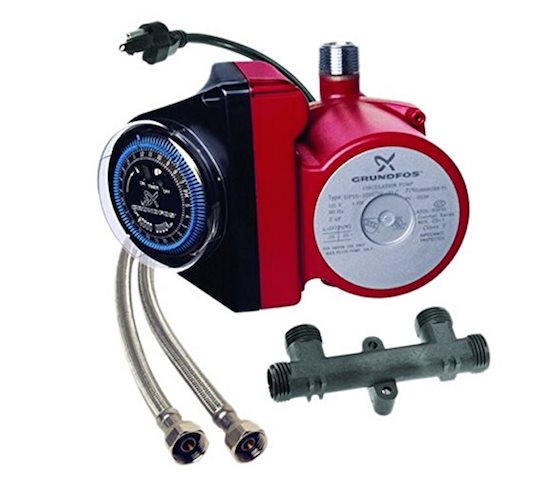Hot Water Recirculating Pumps

This is a reliable hot water recirculating pump you can install on top of your water heater. The weird threaded fitting goes under the sink that's farthest away from the pump. CLICK THE IMAGE NOW TO ORDER THIS PUMP.
"To get instant hot water as you often find at hotels and other institutions, you need to have a loop in the piping system that circulates hot water back to the water heater."
Hot Water Recirculating Pump TIPS
- Loop needed to get cold water back to the heater
- Can be created easily under a sink - See Below
- WATCH my Video about Recirculating Pumps BELOW
- Gravity loops work great but must be done in a new home or large remodel
- CLICK HERE to Get Tim's FREE & FUNNY Newsletter!
DEAR TIM: I believe I need a recirculating pump. It takes about 30 seconds for hot water to reach my shower each morning. It's frustrating to wait that long.
Is it possible to have hot water within a second or two after I turn on the valve? I have seen different recirculating systems that promise hot water instantly and they talk about huge energy and water savings.
Is this true? Is there a way to get hot water using simple gravity instead of a pump? Chad G., Birmingham, AL
Related Links
An Easy Hot Water Recirculating System
A Gravity Hot Water Loop - No Pump Required!
DEAR CHAD: Many people wait for hot water just as you do each morning.
What Plumbing Fixtures Waste Water?
Here's a list of plumbing fixtures that waste water waiting for hot water to show up:
- vanity sinks
- kitchen sinks
- dishwashers
- washing machines
Fortunately, this problem can be solved one of two ways depending upon how your plumbing system is designed.
Free & Fast Bids
CLICK HERE to get FREE & FAST BIDS from local plumbers to install a recirculating pump.
Can a DIYer Install a Hot Water Recirculating Pump?
A DIYer probably doesn't have the skills needed to install a hot water recirculating pump.
Keep in mind that the work to achieve your goal is not something the average do-it-yourselfer can tackle. If you've not worked with water supply lines, you could get into trouble fast with a water leak.
What's more, certain cities and states have strict regulations with respect to modifications made to water supply systems that are connected to public water systems. Be sure to call your local plumbing inspector before you cut into your piping system.
Free & Fast Bids
CLICK HERE to get FREE & FAST BIDS from local plumbers who will install a recirc pump.
Is It Okay to Waste Water?
Clean water is a valuable natural resource and it should not be wasted. The trouble is, in many localities, water might be a very cheap commodity. When prices are low, people tend to waste. The trend is for higher and higher water and sewer bills if you get water from a city or county supplier.
I grew up in Cincinnati, Ohio and the Cincinnati Water Works constantly ratchets up the cost of water. In Cincinnati, your sewer bill depends on how much water you buy, so if you water a lawn or plants, you pay more even though you're not allowing that water to go into the sewer system.
You have to add in the cost of your sewer bill when you try to calculate what water is really costing you. Don't forget to do this.
For example, a cubic foot of water used to cost me just a little over 1.6 cents. Once again, it's a moving target so you have to look at your water bill and see what you pay per cubic foot. Don't forget to take into account your sewer bill.
How Much Water is Wasted Waiting for the Hot Water?
There is a very good possibility that you waste less than a tenth of a cubic foot of water each morning. To prove this, assume that there is 25 linear feet of three quarter inch piping between your shower faucet and water heater.
Do the math and you will find out that there is just .076 cubic feet of water inside the water pipe. When I was paying just 1.6 cents per cubic foot of water, to waste one dollar's worth of water, I'd have to take over 800 showers.
How Do You Get Instant Hot Water?
You need to have a loop in the piping system that circulates hot water back to the water heater to get instant hot water as you often find at hotels and other institutions.
Most houses do not have a dedicated loop as the hot water pipe typically dead ends at the plumbing fixture that is farthest away from the heater.
Can A Recirculating Loop Be Added to an Existing Home?
It's possible to install an effective return loop in single-story houses that have a basement or crawl space where the water supply pipes are visible below the floor joists. Two-story houses make this task nearly impossible, as the piping system is typically hidden in the walls of the home.
CLICK HERE to get FREE & FAST BIDS from local plumbers to install a recirculating pump.
Is it Easy to Install the Loop in a New Home?
Yes, it's very easy and inexpensive to add the return loop leg in new construction.
If you're building a new home or doing a major remodel where you can expose the water lines going to the second floor, you can install the second half of the return loop in less than four hours in many cases.
CLICK HERE to get FREE & FAST BIDS from local plumbers who will install a recirc pump.
What is the Alternative to A Piping Loop?
The alternative to a hot-water piping loop is to use the existing cold water line to a sink as the return leg of a loop.
But, you don't have to install a return loop if you choose to use a modern recirculating pump system. These products employ a nifty temperature actuated bypass valve that connects the cold and hot water supply lines at the fixture that is farthest away from the water heater.
The bypass valve uses the cold water line as the return loop back to the water heater.
Are All Recirculating Pump Systems the Same?
Not all recirculating pump systems are the same. One system places the pump under the sink at the farthest fixture. You have to push a button to start the pump.
The trouble with this system is that you still have to wait for hot water. What's more, this pump needs high voltage electric to operate. It can be a huge challenge to install an outlet under a sink.
Another system activates a remote pump that can be near the water heater. The trouble with this system is that it pumps water through the system whenever the temperature drops at the activation valve. This system wastes energy dollars as it pumps hot water while you sleep and are away.
What Does the Best Recirculating Pump System Have?
Perhaps the best pump system is one that has a temperature controlled bypass valve under the farthest fixture sink and a timer on a pump that can be conveniently located adjacent to the water heater.
The timer can be set to go on and off at 15-minute intervals depending upon when you feel you need hot water at the fixtures. CLICK HERE to see this great pump with a timer.
The pump is equipped with a handy extension cord that can be plugged into a convenience outlet near the pump. There is no water waste with this pump and it also minimizes energy waste since it only sends hot water into the water supply lines during the programmed times.
Can I Just Install a Gravity Hot-Water Loop?
Gravity hot water recirculating loops that do not require a pump can sometimes be installed after a house is built. They will only work when the water heater is below the water supply lines in a basement or crawl space. This system requires that the hot water line return back to the heater after it services the farthest fixture.
How Much of the Piping Needs to be Insulated?
The entire hot water pipe, plus the return piping must be well insulated for the loop to work. The last 15 feet of the return line must not have insulation on it for the convection to happen.
Modern water heaters have a pesky rubber flapper on the hot water outlet pipe and sometimes the incoming cold water inlet. These must be cut out or a large hole drilled in it. If you don't do this, the hot water can't float up through the gravity loop.
The rubber flapper works well when water pressure forces it open when you call for hot water. But it will not open if water is trying to gently float up the pipe.
CLICK HERE to get FREE & FAST BIDS from local plumbers who can do this job for you.
The pump shown above was the one recommended to Cynthia in the November 25, 2008 AsktheBuilder Newsletter to solve her slow hot water.
Column 413


35 Responses to Hot Water Recirculating Pumps